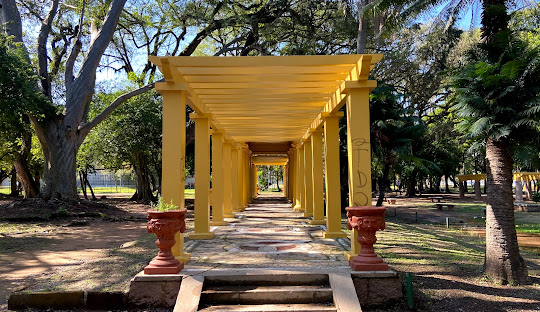POST-COLONIAL AFRICA: the problem of national identity
DOI:
https://doi.org/10.18764/2236-4358v14n43.2024.46Keywords:
Identity; Africa; post-colonial; national State; Plurinational State.Abstract
The research seeks to find an answer to the following problem: how to explain the question of the search for a national identity on the African continent? Its time frame is the postcolonial period in Africa. After the Second World War, with Europe weakened, the European colonies
on the African continent will mobilize, aiming to gain their own freedom. Freed, each country or territory on the African continent will have to face the challenge of preserving its unity. Linked to this is the need to deal with issues relating to identity (of African, but also respectively of Ghanaian,
Mozambican, Angolan, South African, Nigerian etc.). However, the construction of a national identity is, in itself, a very complex task and a problem that is difficult to solve. In the African case, understanding the issue of national identity requires those willing to face this task to observe several elements, for example: a) the challenge of keeping the new State united; b) the post-colonial period
bears the mark of historical novelty; c) the difficult politics on the continent; d) Tradition as a defining element.
Downloads
References
APPIAH, Kwame Anthony. Na casa de meu pai: A África na filosofia da cultura. Rio de Janeiro: Contraponto, 2014.
BAMBARA, Romuald Évariste. Philosophie et développement de l’Afrique, Afrique et développement, v. 43, n. 3, 2018, p. 1-24. Audiência de 30 mai. 2007. Disponível em: < https://codesria.org/IMG/pdf/-219.pdf >. Acesso em: 8 jun. 2019.
CAHEN, Michel. L’État ne crée pas la nation: la nationalisation du monde. Autrepart, n. 10, p. 151-170, 1999. Disponível em: < https://horizon.documentation.ird.fr/exl-doc/pleins_textes/pleins_textes_7/autrepart/010019331.pdf >. Acesso em: 25 out. 2021.
CONAC, Gérard. Les processus de démocratisation en Afrique. In: CONAC, Gérard (dir.). L’Afrique en transition vers le pluralisme politique. Paris: Economica, 1993, p. 11-42. Disponível em: < https://storage.googleapis.com/cantookhub-media-eden/6d/511c3634374dcdba2f5f5117cdf93f1708977b.pdf >. Acesso em: 23 set. 2019.
DIAGNE, Souleymane Bachir. Islam et Philosophie: Leçons d’une rencontre. Diogène, n. 202, p. 145-151, abr./jun. 2003. Disponível em: < file:///C:/Users/mlver/Downloads/DIO_202_0145.pdf >. Acesso em: 13 set. 2019.
DIOP, Cheikh Anta. Les Fondements politiques, économiques, culturels, industriels, technologiques et scientifiques d’un futur État fédéral d’Afrique Noire. Paris: Présence africaine, 2000.
FOÉ, Nicole. Afrique en dialogue, Afrique en auto-questionnement: universalisme ou provincialisme? “Compromis d’Atlanta” ou initiative historique? Educar em Revista, n. 47, p. 175-228, jan./mar. 2013. Disponível em: < https://www.scielo.br/pdf/er/n47/11.pdf >. Acesso em: 4 jul. 2020.
GYEKYE, Kwame. Person and Community in African thought. In: COETZEE, Peter H.; ROUX, Abraham P.J. (eds). The African Philosophy Reader. New York: Routledge, 2002, p. 297-312. Tradução para uso didático por Thiago Augusto de Araújo Faria.
HAMPÂTÉ BÂ, Amadou. A noção de pessoa na África Negra. Tradução para uso didático de: HAMPÂTÉ BÂ, Amadou. La notion de personne en Afrique Noire. In: DIETERLEN, Germaine (ed.). La notion de personne en Afrique Noire. Paris: CNRS, 1981, p. 181 – 192, por Luiza Silva Porto Ramos e Kelvlin Ferreira Medeiros. Disponível em: < https://filosofia-africana.weebly.com/uploads/1/3/2/1/13213792/amadou_hampat%C3%A9_b%C3%A2_-_a_no%C3%A7%C3%A3o_de_pessoa_na_%C3%A1frica_negra.pdf >. Acesso em: 12 fev. 2018.
HAMOUDA, Houda Ben; RAMONDY, Karine. Mémoires et constructions nationales en Afrique. CAIRN.INFO: Matières à Réflexion, v. 3 n. 117-118, p. 4-9, 2015. Disponível em < file:///C:/Users/mlver/Downloads/MATE_117_0004.pdf >. Acesso em: 6 jan. 2021.
KEITA, Boubakar N. História da África Negra: Síntese de História Política e de Civilizações. Luanda: Texto Editora, 2009.
KOUVOUAMA, Abel. Pensar a política na África. PÓLEMOS, v. 4, nº 8, p. 105-111, 2015. Tradução de Thiago Ferrare Pinto. Disponível em: < file:///C:/Users/mlver/Downloads/admin-12.pdf >. Acesso em: 23 nov. 2019.
LAFONTANT, Jean. Langues, cultures et territoires, quels rapports? Cahiers Franco-Canadiens de l'Ouest, v. 7, n. 2, p. 227-248, 1995. Disponível em < https://ustboniface.ca/presses/file/documents---cahier-vol-7-no-2/72Lafontant.pdf >. Acesso em: 8 dez. 2021.
LIMA, Claudia Silva. O Islamismo na África. Disponível em: < http://www.claudialima.com.br/pdf/o_islamismo_na_africa.pdf >. Acesso em: 13 de mai. 2019.
LOTT, Tiago Horácio. Ngugi wa Thiong’o: a literatura afroeuropeia e a escritura em gikuyu. Rónai: Revista de Estudos Clássicos e Tradutórios, v. 1, n. 2. p. 119-130, 2013. Disponível em: < file:///C:/Users/mlver/Downloads/23078-Texto%20do%20artigo-91109-1-10-20150818.pdf >. Acesso em: 4 set. 2020.
MAUDUIT, Rémy M. Éditorial: Les défis de l’identité nationale. In: ASPJ Afrique & Francophonie, v. 1, n. 4, p. 1-2, 2010. Disponível em: < https://www.airuniversity.af.edu/Portals/10/ASPJ_French/journals_F/Volume-01_Issue-4/editorial_f.pdf >. Acesso em: 7 set. 2021.
MAZRUI, Ali Al’amin. The African Condition: A Political Diagnosis. London: Heinemann, 1980.
MENKITI, Ifeanyi A. Person and community in African traditional thought. In: WRIGHT, R.A. (ed.). African philosophy: An introduction. Washington: University Press of America. 1984, p. 171-181.
NGUGI WA THIONG’O. Decolonising the mind: The politics of language in african literature. Nairobi: EAEP, 1997.
NZINZI, Pierre. A democracia na África: A ascendência platônica. Revista Reflexões de Filosofia, a. 11, n. 20, p. 216-231, 2022. Tradução de Francisco Antonio de Vasconcelos. Disponível em < https://www.researchgate.net/publication/359849350_A_DEMOCRACIA_NA_AFRICA_A_ASCENDENCIA_PLATONICA >. Acesso em: 6 jan. 2021.
ORTEGA Y GASSET, José. La Rebelión de las masas. Barcelona, Planeta-Agostini, 1985.
ORUKA, Henry Odera. “Sage Philosophy: The Basic Questions and Methodology”. In: H. Odera Oruka (ed.) Sage Philosophy: Indigenous Thinkers and Modern Debate on African Philosophy. Nairobi: ACTS Press, 1991.
ROSBERG, Carl G. National Identity in African States. The African Review, v. n. 1, p. 79-92, 1971. Disponível em: < https://journals.co.za/doi/pdf/10.10520/AJA00020117_33 >. Acesso em: 2 nov. 2021.
SANTOS, Roberto Magalhães dos. Uma breve reflexão sobre o Islamismo africano e sua chegada ao Brasil. Emblemas, v. 14, n. 2, p. 43-54, 2017. Disponível em: < file:///C:/Users/mlver/Downloads/50586-Texto%20do%20artigo-219383-1-10-20180427.pdf >. Acesso em: 16 abr. 2019.
VASCONCELOS, Francisco Antonio de. Filosofia africana e a descolonização do pensar. Saberes Interdisciplinares, a. 10, n. 20, p. 40-51, 2017. Disponível em < https://www.researchgate.net/publication/354322327_Filosofia_africana_e_a_descolonizacao_do_pensar >. Acesso em: 6 jan. 2021.
WIREDU, Kwasi. Philosophy and an African culture. Cambridge: Cambridge University Press, 1980.
Downloads
Published
How to Cite
Issue
Section
License
Copyright (c) 2024 Revista Húmus

This work is licensed under a Creative Commons Attribution 4.0 International License.







